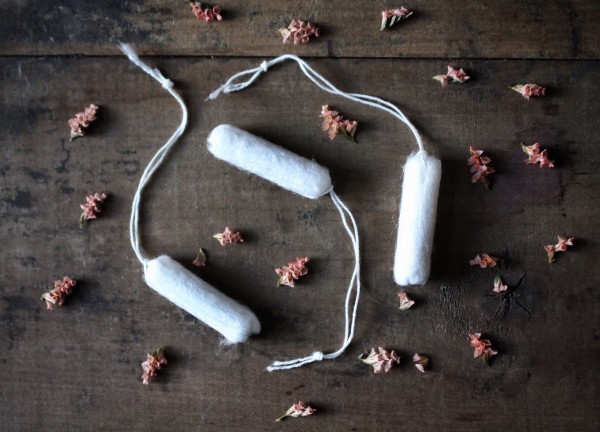A woman’s period can be her greatest blessing, but also, sometimes, the bane of her month. It is our great connection to the cosmos as well as a step toward the creation of new human life. The period is so powerful it can take hold of our metal & physical states bringing our lives to a momentary standstill. Despite all of the strength & glory of this phase of the menstrual cycle, it can be a messy affair requiring supplies, like tampons, to maintain our day to day lifestyle.
For the past 16 years I have been a faithful Playtex user. They are the tampons my mom favored & the ones she passed down to me when my time came. I suppose I never questioned this as a youth because I trusted my mom’s judgement to provide what’s best. In all honesty, I like Playtex tampons -I like the way they open, becoming wider & not longer. They are comfortable, cheap, convenient & easy to use. Unfortunately, like other products that are cheap & convenient, conventional brand tampons may be toxic to our health & are definitely toxic to the environment.
Tampons & pads are classified by the FDA as medical devices which means manufactures are not required to disclose what materials their products are made of and what chemical residues may be present. Despite the lack of scientific studies proving the direct link between pesticides & chemicals that may be found in conventional tampons to feminine cancers and diseases, I’ve used my personal judgement and decided that I do not want to place anything inside of my body (not to mention near my reproductive organs) that could possibly cause them harm. I’m careful about the food I eat and the products I put on my body, why should my tampons and pads be exempt? In addition to being made with synthetic materials and chemicals, conventional tampons & pads are polluters of the environment. Non-biodegradable or recyclable pads, tampons & applicators are piling up our landfills and polluting our oceans.
If you are interested in using products that are better for your personal health as well as the health of the planet, check out some of the alternatives below.
- LOLA tampons are a good option if you’re not ready to give up the familiarity of tampon use. The tampons, which are delivered straight to your door, are made of 100% cotton, are bio-degradable & contain no other additives. The plastic applicators are BPA-free & recyclable.
- The use of a menstrual cup significantly helps reduce period related waste as it is reusable every month. There are different models available made of medical grade silicone insuring no leeching of chemicals into your body and bloodstream. Other cups, like MeLuna, are available in different widths and sizes ensuring comfort & effectiveness.
- Like the menstrual cup, the vaginal sponge is also reusable and reduces the amount of waste created during our periods. The sponges available from Holy Sponge! are made of sustainably sourced sea sponge ensuring the elimination of potential toxin exposure associated with conventional methods.
- While the creators of Thinx undies are not completely transparent about the materials & possible chemicals used in the manufacturing of their undies, often referring to the materials & methods as “technology”, they do provide a product that is reusable and potentially better for the environment than conventional methods. Thinx also has a noteworthy social mission, helping to provide reusable pads to young women in Uganda. 50% of young women in Uganda miss school during the week of their period due to lack of proper supplies. By providing reusable pads to Uganda’s young women, Thinx is encouraging their education & the development of their communities.

